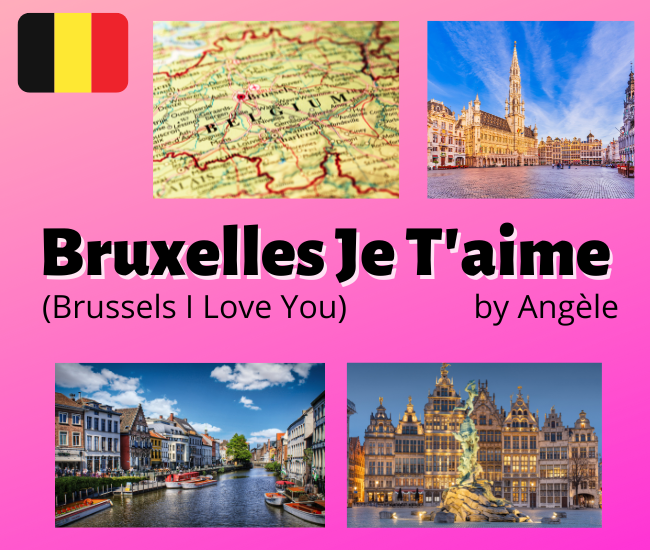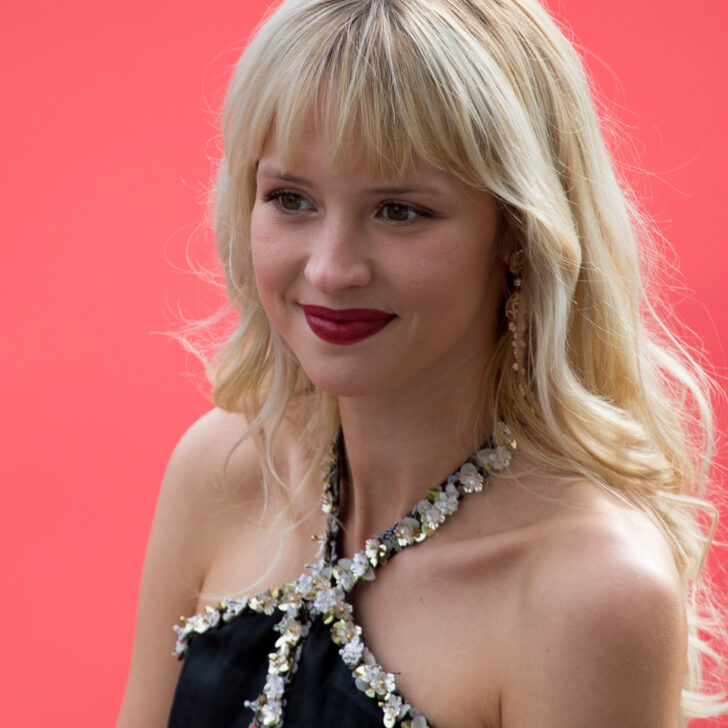“Bruxelles Je T’aime“ (Meaning in English: Brussels I Love You; Pronunciation: bʀysɛl ʒə tem) is a hit song by Belgian singer Angèle. Released in 2021 on the album Nonante-Cinq (meaning ninety-five in Belgian French), the lyrics of Bruxelles Je T’aime deal with the longing for and love of the city of Brussels and country of Belgium.
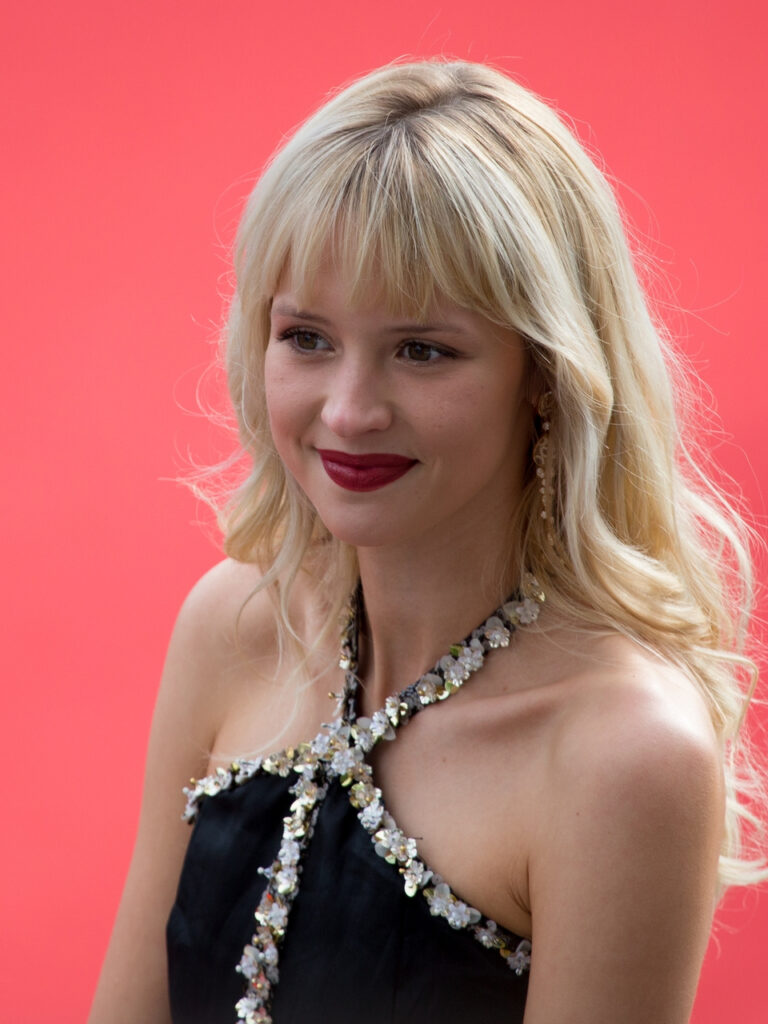
Bruxelles Je T’aime song synopsis
In a nutshell, the song “Bruxelles Je T’aime” is about the love for the capital city of Brussels and the desire for the continued unity of Belgium, a country which could potentially be split by its two languages (French and Flemish).
In the beginning of the song, Angèle sings about the things that Brussels lacks that other cities have (On n’a pas les tours de New York, We don’t have New York’s skyscrapers). She then sings about the typical bad weather and that people in Brussels can still have a good time (le ciel couvrira une tempête, the sky will be covered with a storm; les gens feront la fête, people will party).
Angèle then sings the chorus, singing (Bruxelles je t’aime, Tu m’avais manqué, tu es la plus belle; Brussels I love you, I missed you, you’re the most beautiful).
In the next verse, Angèle acknowledges Paris (Paris m’appelle, Paris calls me) but then personifies Brussels and Belgium (Quand mon pays et ma ville me manquent, moi je ne t’oublie pas, When I miss my city and my country, I don’t forget you).
She also mentions still loving her country despite it never winning the World Cup (C’est dur de garder l’espoir, quand on n’est pas les premiers (It’s hard to keep hope, when we’re not the first).
The last section of lyrics touches on the the political issues which exist in Belgium and the desire for continued unification of the country. She sings, “Si un jour elle se sépare, Ce serait le pire des cauchemars; If one day the country separates, it would be the worst of nightmares”.
Interestingly, she makes it a point to also include a line in Flemish: “Laat mij het zeggen in het Vlaams, dank u Brussel voor mijn naam, Let me say it in Flemish, thank you Brussels for my name”.
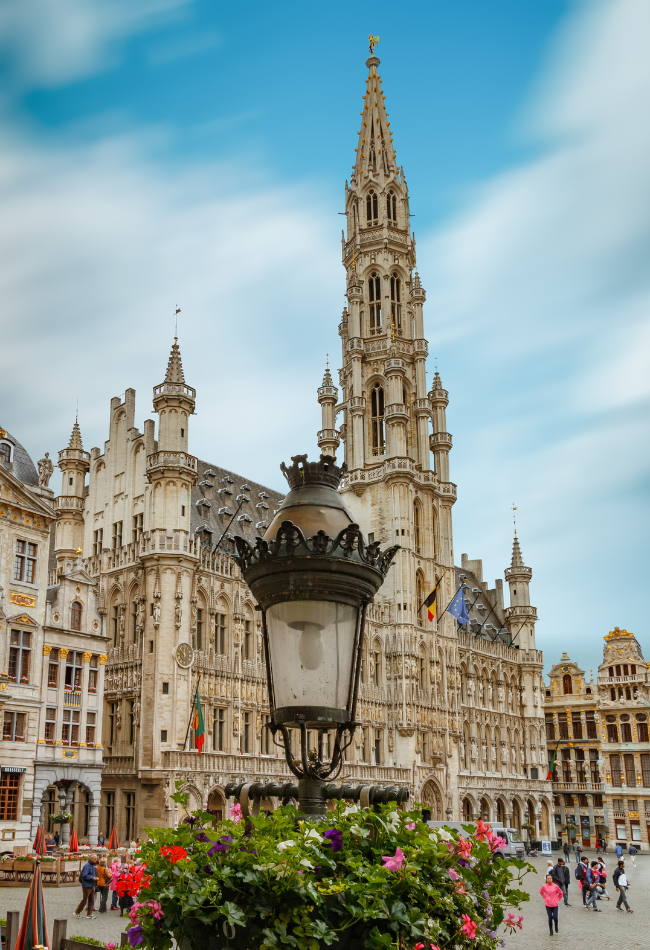
Listen to Bruxelles Je T’aime
The official YouTube video for “Bruxelles Je T’aime” has over 27 million views. The video features Angèle singing and dancing in a train, perhaps on her way back to Brussels from Paris.
In the video there are scenes of Angele having fun with kids and later partying with adults. As in the train advances, there are images of an overcast sky, typical for Belgium.
The video shows the Atomium two times. The Atomium is a a famous landmark in Brussels from the 1958 World’s Fair. In the beginning of the video Angèle is holding a snow globe containing the famous landmark. At the end of the video she’s seen standing next to the a model of the famous site.
You can also listen on Spotify:
Lyrics analysis
In the following section we’ve analyzed the lyrics of “Bruxelles, Je T’aime” and highlighted vocabulary and grammar points which we think offer interesting insights into learning French.
On n’a pas les tours de New York
This line translates to “We don’t have New York’s skyscrapers”. “On n’a pas” translates literally to “One doesn’t have”. The personal pronoun “on” has several meanings including “one”, “we” and “people” in general.
“A” is the third-person (il/elle) form of “avoir“ (to have). “N’a pas” means “doesn’t have”. “Ne + verb + pas” is the most basic French negation rule.
“Les tours” translates literally to “the towers”. Our translation was “skyscrapers”, which is really “gratte-ciel” in French.
On n’a pas de lumière du jour, 6 mois dans l’année
This line translates to “We don’t have daylight for six months out of the year”. This line is making reference to the dark and gloomy weather that are typical for both Belgium and northern France.
The French expression “lumière du jour“ translate to “daylight”. There are two words for “year” in French: “mois” means “month” and “année” or “an”.
On n’a pas Beaubourg ni la Seine
This line translates to “We don’t have Beaubourg or the Seine”, making reference to Paris’ highlights. Beaubourg is an area in the 4th arrondissement of Paris. The Seine is the major river which runs through the heart of Paris.
On n’est pas la ville de l’amour, mais bon vous voyez
This line translates to “We’re not not the city of love, but you see”. “On n’est pas” means both “One isn’t” and “we’re not”. “Est” is the third-person singular form of “être” (to be). Paris is often referred to as the city of love.
“Mais” means “but” and “bon“ means “good”. “Vous voyez” means “you see” and comes from the verb “voir” (to see). There are two ways to say “you” in French: tu (informal) and vous (formal and plural).
Et sûrement que dès ce soir le ciel couvrira une tempête
This line translates to “And certainly starting tonight the sky will be covered with a storm”. The adverb “sûrement“ translates to “most likely”, “very probably” and “surely”. “Couvrira” is the third-person singular form of “couvrir” (to cover) in the future tense.
Mais après l’orage avec des bières, les gens feront la fête
This line translates to “But after the storm people will party with beers”, making reference to both Belgium’s typical stormy weather and popularity of the famous domestic beers.
Both “orage” and “tempête” are synonyms for “storm“. The expression “faire la fête” means “to party” and “to celebrate” in French.
Tu m’avais manqué
This line translates to “I missed you”. The verb “manquer“ means both to miss in French. The rule for manquer states that “whatever is being missed is the subject of the sentence”. Hence, for this line line “tu” is referring to Brussels. This page covers how to say “I miss you” in French.
“Avais” is the the second-person singular (tu) form of “avoir” (to have) in the imperfect tense, a French past tense use for describing past actions which occurred at undefined times.
T’es ma préférée
This line translates to “You’re my favorite”. “T’es” is a shortening of “tu es” (you are). “Ma” is a possessive adjective meaning “my” when preceding feminine nouns. There are two ways to say “favorite” in French: “préféré” and “favori”.
T’es la plus belle, oui t’es la plus belle
This line translates to “You’re the most beautiful, yes you’re the most beautiful”. “La plus belle” is a superlative, meaning “the most”. “Oui” means “yes” in French.
On n’a pas la plus longue de toutes les histoires
This line translates to “We don’t have the longest of all the histories”. This line makes reference to the shorter history of Belgium relative to its neighboring European countries. The current Belgium was established in 1830.
On le sait on n’a pas toujours gagné
This line translates to “We know we still haven’t won”. “On le sait” translates literally to “One (or we) know it”. There are two says to say “to know in French“: savoir and connaître.
The word “toujours“ has two meanings in French: “always” and “yet”. In the context of this line, “toujours” means “yet”. The verb “gagner“ also has two meanings: “to win” and “to earn (money)”.
Et d’habitude, j’ai l’attitude, même si c’est dur, de garder espoir
This line translates to “And usually, I have the attitude to keep hope even if it’s hard”. “D’habitude“ means “usually” in French. The word “même“ has several translations including “same” and “even”. “Même si” means “even if”.
The expression “garder espoir“ translates to “to stay hopeful”, “to keep hope alive” and “to not loose hope”.
Quand on n’est pas les premiers
This line translates to “When we’re not the first”. “Quand” means “when” in French. “Premier“ means “first” in French.
Les Marolles, Flagey, Saint-Gilles, Laeken à qui je dois mon nom
This line translates to “Marolles, Flagey, Saint-Gilles and Laeken, to whom I owe my name”. In this line, Angèle makes reference to places in and around the Brussels area. “À qui“ translates “to whom”.
Et si un jour elle se sépare et qu’on ait à choisir un camp
This line translates to “And one day the country separates and I must pick a side”. In French “elle” means “she”. In the context of this line, “elle” refers to Belgium as “la Belgique” is a feminine noun in French.
“Séparer” means to separate. As a reflexive verb, “se séparer” means “to separate itself”. The advanced structure “que + subject pronoun + subjunctive + a + infinitive” means “must”. In French, “camp“ can also translate to “faction”.
Ce serait le pire des cauchemars, tout ça pour une histoire de langue
This line translates to “It will be the worst of nightmares, all that for a story of languages”. “Serait” is the third-person singular form of “être” (to be) in the conditional tense, meaning “would be”. “Pire” means “worse” or “the worst” and “cauchemar” means “nightmare“.
“Pour“ means “for” but in the context of this line means “because of”. “Une histoire de langue” (a history [story] of languages” refers to Belgium being composed of both French and Flemish-speaking populations. Roughly 60% of Belgium speaks Flemish (a dialect of Dutch) and 40% speaks French.
J’ai vécu mes plus belles histoires en français et en flamand
This line translates to “I lived had my most beautiful life experiences in French and Flemish”. “Vécu” is the past participle of the verb “vivre“, which means both “to live” and “to experience”.
In the context of this line, we translated “histoires” (meaning histories and stories) to “experiences”, as in “life experiences”. “Flamand“ means “Flemish” in French.
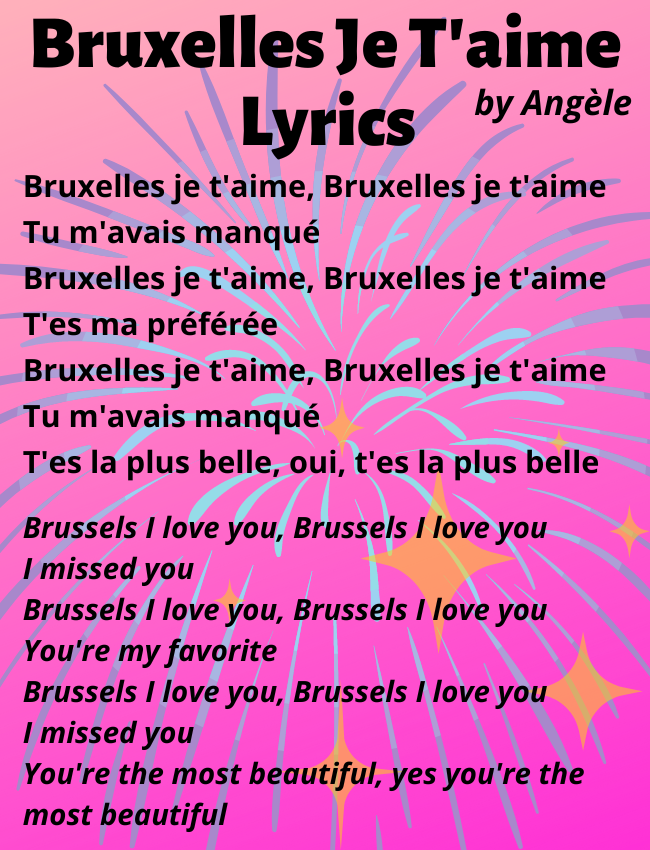
Bruxelles Je T’aime – French Lyrics & English Translation
On n’a pas les tours de New York
On n’a pas de lumière du jour, 6 mois dans l’année
On n’a pas Beaubourg ni la Seine
On n’est pas la ville de l’amour, mais bon vous voyez
We don’t have New York’s skyscrapers
We don’t have the light of day for six months out of the year
We don’t have Beaubourg or the Seine
We’re not not the city of love, but you see
Et sûrement que dès ce soir le ciel couvrira une tempête
Mais après l’orage avec des bières, les gens feront la fête
And certainly starting tonight the sky will be covered with a storm
But after the storm people will party with beers
Bruxelles je t’aime, Bruxelles je t’aime
Tu m’avais manqué
Bruxelles je t’aime, Bruxelles je t’aime
T’es ma préférée
Bruxelles je t’aime, Bruxelles je t’aime
Tu m’avais manqué
T’es la plus belle, oui t’es la plus belle
Brussels I love you, Brussels I love you
I missed you
Brussels I love you, Brussels I love you
You’re my favorite
Brussels I love you, Brussels I love you
I missed you
You’re the most beautiful, yes you’re the most beautiful
Paris m’appelle quand je veux rentrer chez moi
Quand le ciel gris et la pluie me manquent, je vais mieux quand je te vois
Les villes sont belles mais moi je ne pense qu’à toi
Quand mon pays et ma ville me manquent, moi je ne t’oublie pas
Paris calls me when I want to go home
When I miss the gray sky and rain, I do better when I see you
(Other) cities are beautiful but I only think of you
When I miss my city and my country, I don’t forget you
On n’a pas la plus longue de toutes les histoires
On le sait on n’a pas toujours gagné
Et d’habitude, j’ai l’attitude, même si c’est dur, de garder espoir
Quand on n’est pas les premiers
We don’t have the longest of all the histories
We know we still haven’t won
And usually, I have the attitude to keep hope even if it’s hard
When we’re not the first
Les Marolles, Flagey, Saint-Gilles, Laeken à qui je dois mon nom
Marolles, Glagey, Saint-Gilles and Laeken, to whom I owe my name
Bruxelles je t’aime, Bruxelles je t’aime
Tu m’avais manqué
Bruxelles je t’aime, Bruxelles je t’aime
T’es ma préférée
Bruxelles je t’aime, Bruxelles je t’aime
Tu m’avais manqué
T’es la plus belle, oui, t’es la plus belle
Brussels I love you, Brussels I love you
I missed you
Brussels I love you, Brussels I love you
You’re my favorite
Brussels I love you, Brussels I love you
I missed you
You’re the most beautiful, yes you’re the most beautiful
Paris m’appelle quand je veux rentrer chez moi
Quand le ciel gris et la pluie me manquent, je vais mieux quand j’te vois
Les villes sont belles mais moi je ne pense qu’à toi
Quand mon pays et ma ville me manquent, moi, je ne t’oublie pas
Paris calls me when I want to go home
When I miss the gray sky and rain, I do better when I see you
(Other) cities are beautiful but I only think of you
When I miss my city and my country, I don’t forget you
Et si un jour elle se sépare et qu’on ait à choisir un camp
Ce serait le pire des cauchemars, tout ça pour une histoire de langue
J’ai vécu mes plus belles histoires en français et en flamand
Laat mij het zeggen in het Vlaams, dank u Brussel voor mijn naam
And one day if we separate and I must pick a side
It will be the worst of nightmares, all that for a story of langauges
I lived had my most beautiful life experiences in French and Flemish
Let me say it in Flemish, thank you Brussels for my name
Et si un jour, elle se sépare et qu’on ait à choisir un camp
Ce serait le pire des cauchemars, tout ça pour une histoire de langue
J’ai vécu mes plus belles histoires en français et en flamand
Laat mij het zeggen in het Vlaams, dank u Brussel
And one day the country separates and I must pick a side
It will be the worst of nightmares, all that for a story of languages
I lived had my most beautiful life experiences in French and Flemish
Let me say it in Flemish, thank you Brussels
Bruxelles je t’aime, Bruxelles je t’aime
Tu m’avais manqué
Bruxelles je t’aime, Bruxelles je t’aime
T’es ma préférée
Bruxelles je t’aime, Bruxelles je t’aime
Tu m’avais manqué
T’es la plus belle, oui, t’es la plus belle
Brussels I love you, Brussels I love you
I missed you
Brussels I love you, Brussels I love you
You’re my favorite
Brussels I love you, Brussels I love you
I missed you
You’re the most beautiful, yes you’re the most beautiful
Paris m’appelle quand je veux rentrer chez moi
Quand le ciel gris et la pluie me manquent, je vais mieux quand j’te vois
Les villes sont belles mais moi je ne pense qu’à toi
Quand mon pays et ma ville me manquent, moi, je ne t’oublie pas
Paris calls me when I want to go home
When I miss the gray sky and rain, I do better when I see you
(Other) cities are beautiful but I only think of you
When I miss my city and my country, I don’t forget you
Paris m’appelle quand je veux rentrer chez moi
Quand le ciel gris et la pluie me manquent, je vais mieux quand j’te vois
Les villes sont belles mais moi je ne pense qu’à toi
Quand mon pays et ma ville me manquent, moi, je ne t’oublie pas
Paris calls me when I want to go home
When I miss the gray sky and rain, I do better when I see you
(Other) cities are beautiful but I only think of you
When I miss my city and my country, I don’t forget you
Discover more:
- Angèle — Balance Ton Quoi
- Indila – Dernière Danse
- Indila – Tourner Dans Le Vide
- Indila “Love Story”
- Indila – Parle à ta tête
- Amir & Indila — Carrousel
- Edith Piaf songs
- Celine Dion songs
- Top French female singers
- Top French male singers
